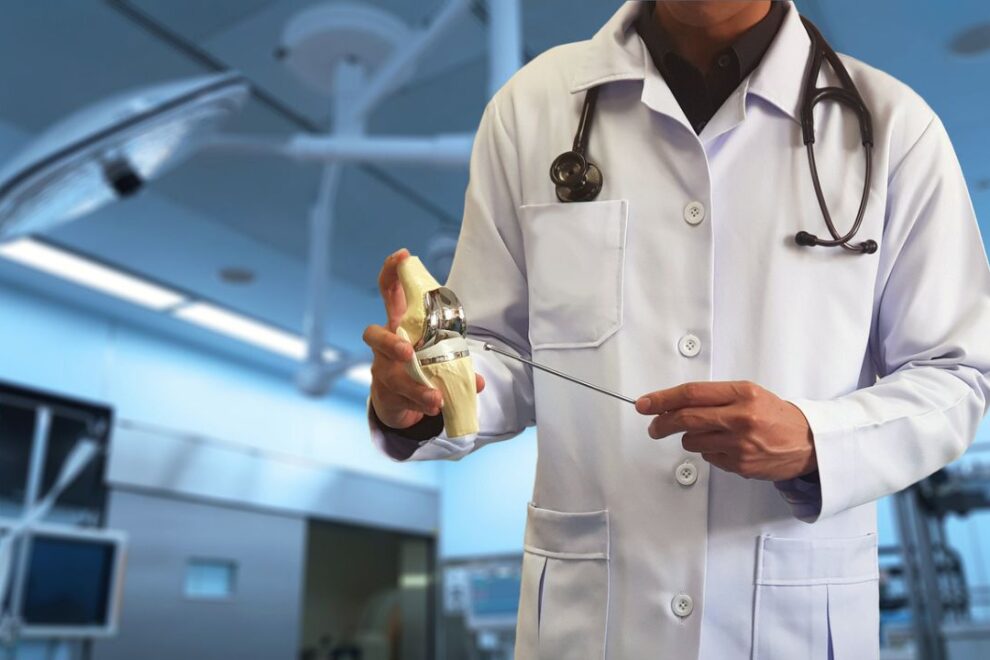Revision of knee Replacement Surgery in India
Revision of knee Replacement Surgery in India, when a knee prosthesis are get damaged it will be replaced, and used of temporary knee prosthesis. It will happen when there is a fracture in your knee or leg that causes damage to the knee prosthesis. Then, the patient gets treated by Revision of Knee Replacement Surgery. For this treatment, there is a use of higher advanced machinery and technology.


Free Doctor Opinion

Personalized care with a warm interaction with the patient
- Achieving outstanding success rates through our dedicated care approach.
- Equipped with the latest technology to ensure optimal treatment outcomes.
- Our expert team provides exceptional healthcare with experience.
- Offering 24/7 assistance for your health needs and concerns.
- Providing quality treatment at reasonable costs for every patient.
- Contact us Email ID:[email protected]
- Call us: +91 9029304141
What is Revision Knee Replacement Surgery in India?
Revision Knee Replacement Surgery is a surgical treatment that will treat a damaged knee and joint parts. When an individual is caused by infection, trauma, instability, implant dislocation, fractures, and stiffness, they will need a treatment of Revision Knee Replacement Surgery. It happens because when a knee prosthesis is damaged by infection or fractured etc. The surgeons will use the best devices and techniques. Their surgeon will treat a patient by minimally invasive surgery. It is the best treatment.
During the treatment, minimally invasive techniques are used. It gives less pain and fewer scars. In this, there is a requirement of special tools; with the help of tools they can able to see and do the procedure through the smaller incision. These tools help to remove a damaged knee prosthesis and reshape the bone. Then, surgeons will implant a new prosthesis. It is very complex procedure than the initial knee replacement. There are highly qualified and experienced specialists, they will complete the treatment by using techniques and knowledge.
In India, Revision Knee Replacement is a very successful treatment, and most individuals are happy with the results. Right now, you are searching for the best clinic or hospital in India, and you want to undergo treatment. We consider the best clinic for Revision Knee Replacement Surgery in India as “We Care India”. It provides you with the best treatment facility for Revision Knee Replacement Surgery. There is a well-qualified and highly experienced team of specialists. They use advanced machinery and technology for Revision Knee Replacement Surgery. Most cases of the treatment are successful.
Why should you trust “We Care India” for Guaranteed Surgery In India?
- First-stage top counseling sessions
- Premium services and processes
- Highly competent specialists for Guaranteed Surgery In India
- Sky-High Surgery Success Rates in India
- Contact us Email ID: [email protected]
- Call us: +919029304141
Procedure for Revision Knee Replacement Surgery in India
Now, here you will know the Procedure of Revision Knee Replacement Surgery. Before the surgery, the doctors will give some instructions on how you should be healthy for the treatment. For the Surgery, it is necessary to eat healthy food, which makes the treatment successful. A Revision Knee Replacement surgery is performed to reconstruct the ligament in the center of your knee. So, let’s know about it in detail.
Before the Procedure of Revision Knee Replacement,
Before the Surgery, you have to reach the hospital. The healthcare team will get ready for the surgery. They will always support you and take care of your health. You will get prepared for the physical exam and imaging tests to plan for the procedure. They check if you are healthy enough for surgery. You have to undergo some additional tests, such as an X-ray. It will help to see the inner damaged part of your knee.
They will ask you about any medicines you are taking, such as over-the-counter medicines such as aspirin or ibuprofen, street drugs, herbs, vitamins, and other supplements. They will also tell you if there are any other medicines you should stop taking ahead of time, like blood thinners, etc. They will tell you about the benefits, risks, and complications of your health conditions. So, before the 12 hours of the surgery, you do not have to eat food or drink water. They will also give you directions for getting ready.
During the Procedure of Revision Knee Replacement,
During the Surgery, a healthcare team is available with you till your surgery is completed. You will receive anesthesia to numb your body, and he/she will not feel any pain. The body gets relaxed and comfortable. The anesthesiologist will give either general anesthesia to put you to sleep. Surgeons will use the best devices and techniques. The orthopedic Surgeon will perform the surgery. They make a small incision over the knee to access the joint. They will use a device to remove an old implant. So, they remove the old implant by cutting scar tissue. They used a graft device to correct the bone defects. After, they insert a new knee prosthesis. Then, they closed the incision with stitches and bandages.
After the Procedure of Revision Knee Replacement,
After the Surgery, when you awake, you get significant pain around your incision. Healthcare providers give you medicines that help to relieve the pain. They will check the result of the surgery, and they do the imaging like an x-ray, so you might be able to go home within a day or two. A healthcare team will give you instructions you have to follow. It takes time to recover properly, you should have to do exercise daily.
Cost of Revision Knee Replacement Surgery in India
A Cost of Revision Knee Replacement Surgery in India is affordable and reasonable. There is are use of highly advanced machinery and technology, and patients are treated by highly qualified and experienced specialists. In this surgery, the procedures are too complex, surgeons will use techniques and knowledge to complete the process. So, the cost is also higher as per their techniques.
You know that, in every treatment, the cost plays a vital role. It is because it is an important factor in which every individual mind the different questions arise, what is the cost of the treatment? Are there any different questions related in their minds? The cost of Revision Knee Replacement Surgery in India is very much based on the specific procedures. Cost depends on the types of treatment, patients, health conditions, and the hospitals.
So, the cost of Revision Knee Replacement Surgery in India ranges from ₹ 2,50,000 to ₹ 7,00,000. The cost depends on several factors such as the location of the hospital, the reputation of the center, the type of treatment used, the individual’s case, the expertise of doctors or surgeons, Length of hospital stay, age, and the health of the patients. In some cases, there is a chance to reduce the cost of Revision Knee Replacement Surgery, including paying in cash, combining multiple procedures into one surgical session, and getting insurance coverage.
Here is the list of costs of Revision Knee Replacement Surgery in India by varying cities and states.
Cost of Revision Knee Replacement Surgery in India | Cost of Revision Knee Replacement Surgery in India (₹) |
Cost of Revision Knee Replacement Surgery in Bangalore | ₹ 2,70,000 to ₹ 3,80,000 |
Cost of Revision Knee Replacement Surgery in Mumbai | ₹ 3,07,800 to ₹ 4,00,000 |
Cost of Revision Knee Replacement Surgery in New Delhi | ₹ 3,02,400 to ₹ 3,70,000 |
Cost of Revision Knee Replacement Surgery in Hyderabad | ₹ 2,86,200 to ₹ 3,20,000 |
Cost of Revision Knee Replacement Surgery in Chennai | ₹ 2,91,600 to ₹ 3,80,000 |
Cost of Revision Knee Replacement Surgery in Kolkata | ₹ 3,24,000 to ₹ 3,50,000 |
Cost of Revision Knee Replacement Surgery in Ahmedabad | ₹ 2,91,600 to ₹ 3,80,000 |
Cost of Revision Knee Replacement Surgery in Kochi | ₹ 3,24,000 to ₹ 3,50,000 |
What are the factors affecting the costs of Revision Knee Replacement Surgery in India?
There are several factors affecting the cost of Revision Knee Replacement Surgery in India. This is because there are different places in India, and the costs depend on people’s living conditions. Every hospital and clinic has different management facilities, technology, and specialists. So, now let’s go into detail.
Location: This factor plays the most important role in deciding the Cost of Revision Knee Replacement Surgery as the cost varies from city to city. Different cities have different costs. For instance, the Cost of Revision Knee Replacement Surgery also varies based on the type of surgery the doctors use.
Surgeons: Surgeons with several lot of experience and skills charge more as compared to surgeons who charge less due to less experience in the medical field.
Patient’s condition: The patient’s age, health, and personal preference can also influence Revision Knee Replacement Surgery in India.
Why choose We Care India for the cost of Revision Knee Replacement Surgery in India?
We Care India is the best medical service provider in India, and we care for the patients and the healthcare provider team. We have a medical team that works 24*7 to handle the medical cases. So feel free to contact us anytime as our friendly medical staff will help you with your medical enquiry. Our highly qualified doctors work 6 days a week to diagnose your disease and assist you with one of the best treatments.
Moreover, our opening hours vary on different days. Mondays through Fridays are different, and Saturdays and Sundays are different. Our trusted medical team offers personalized care. With exceptional service, we ensure successful treatment. Our medical service provider center is considered the top healthcare company that offers the best medications, treatments, surgical processes, etc.
This center offers several treatments or surgeries, such as cosmetic surgery, brain and spine surgery, and cancer treatment. So, this medical center is to make your future bright like the moon. With 25 years of experience in the medical sector, we offer top-notch quality performance to patients with any type of disease. Our center specializes in affordable and reasonable cost of Revision Knee Replacement Surgery in India. We offer smooth Revision Knee Replacement Surgery.

FAQs (frequently asked questions)
In Revision Knee Replacement Surgery, its main goal is to treat a damaged knee and joint parts.
When an individual is caused by infection, trauma, instability, implant dislocation, fractures, and stiffness, they will need a treatment of Revision Knee Replacement Surgery.
In Revision Knee Replacement Surgery, patients are treated by minimally invasive surgery. It is the best treatment which gives less pain and fewer cuts.
The affordable and reasonable cost of Revision Knee Replacement Surgery in India can range from ₹ 2,50,000 to ₹ 7,00,000.
Last Word
In this content, you have learned about the Revision Knee Replacement Surgery in India; it is a complex procedure. Higher qualified and experienced specialists will treat a patients. There are used of best devices and techniques which makes the treatment successful. Minimally invasive techniques are used, which causes less pain and is less invasive. Here, you will know the procedure, causes, and costs.
After reading the content of Revision Knee Replacement Surgery in India, you have gained more information and knowledge about it. You get to know the methods and their costs. The cost is affordable and reasonable. Here, you know the best clinic in India for Revision Knee Replacement Surgery. “We Care India” is the best clinic; it provides you with better facilities and good management.
Read Also :-
- Stenting for GI Tract Surgery: A Minimally Invasive Solution in Digestive Health
- Surrogacy Agency in India: Professional Guidance for Your Parenthood Journey
- Sigmoidoscopy Surgery in India: Early Detection and Affordable Care for Colon Health
- Advanced Spondylosis Surgery in India: Procedures, Costs & Leading Hospitals
- Stenting for GI Tract Surgery: A Minimally Invasive Solution in Digestive Health
- Sigmoid Colectomy in India: Advanced and Affordable Colon Surgery
Committed To Build Positive, Safe, Patient Focused Care.
High Quality
Care
Home Review
Medicine
All Advanced
Equipment
Book An Appointment

At We Care India, we offer complete medical services for your entire family, from routine check-ups to injury care, ensuring personalized attention and expert assistance for all your health needs.


